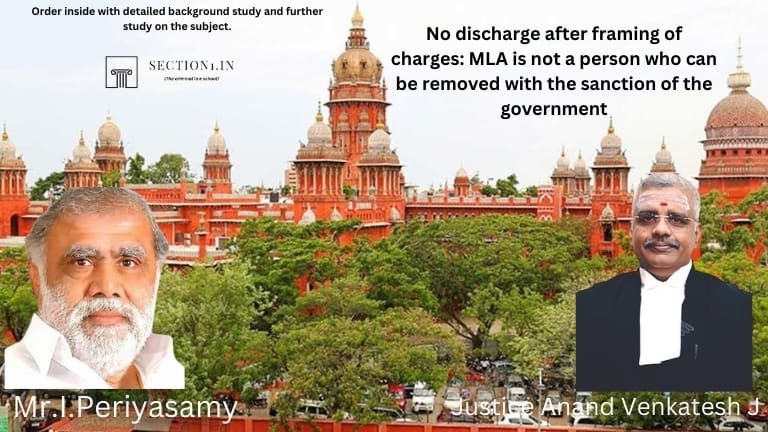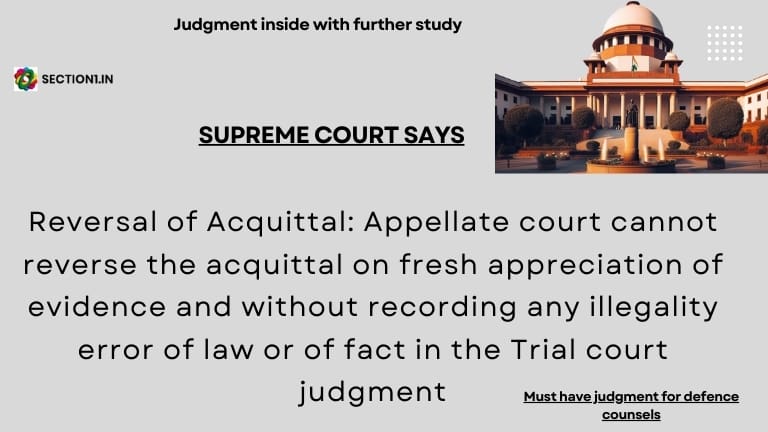Previous Supreme Court judgments that restricted the power to direct further investigation u/s 156 (3) Cr.P.C till framing of charges are overruled
38. There is no good reason given by the Court in these decisions as to why a Magistrate’s powers to order further investigation would suddenly cease upon process being issued, and an accused appearing before the Magistrate, while concomitantly, the power of the police to further investigate the offence continues right till the stage the trial commences. Such a view would not accord with the earlier judgments of this Court, in particular, Sakiri (supra), Samaj Parivartan Samudaya (supra), Vinay Tyagi (supra), and Hardeep Singh (supra); Hardeep Singh (supra) having clearly held that a criminal trial does not begin after cognizance is taken, but only after charges are framed. What is not given any importance at all in the recent judgments of this Court is Article 21 of the Constitution and the fact that the Article demands no less than a fair and just investigation. To say that a fair and just investigation would lead to the conclusion that the police retain the power, subject, of course, to the Magistrate’s nod under Section 173(8) to further investigate an offence till charges are framed, but that the supervisory jurisdiction of the Magistrate suddenly ceases midway through the pre-trial proceedings, would amount to a travesty of justice, as certain cases may cry out for further investigation so that an innocent person is not wrongly arraigned as an accused or that a prima facie guilty person is not so left out. There is no warrant for such a narrow and restrictive view of the powers of the Magistrate, particularly when such powers are traceable to Section 156(3) read with Section 156(1), Section 2(h), and Section 173(8) of the CrPC, as has been noticed hereinabove, and would be available at all stages of the progress of a criminal case before the trial actually commences. It would also be in the interest of justice that this power be exercised suo motu by the Magistrate himself, depending on the facts of each case. Whether further investigation should or should not be ordered is within the discretion of the learned Magistrate who will exercise such discretion on the facts of each case and in accordance with law. If, for example, fresh facts come to light which would lead to inculpating or exculpating certain persons, arriving at the truth and doing substantial justice in a criminal case are more important than avoiding further delay being caused in concluding the criminal proceeding, as was held in Hasanbhai Valibhai Qureshi (supra). Therefore, to the extent that the judgments in Amrutbhai Shambubhai Patel (supra), Athul Rao (supra) and Bikash Ranjan Rout (supra) have held to the contrary, they stand overruled. Needless to add, Randhir Singh Rana v. State (Delhi Administration) (1997) 1 SCC 361 60 and Reeta Nag v. State of West Bengal and Ors. (2009) 9 SCC 129 also stand overruled.
39. We now come to certain other judgments that were cited before us. King Emperor v. Khwaja Nazir Ahmad AIR 1945 PC 18, was strongly relied upon by Shri Basant for the proposition that unlike superior Courts, Magistrates did not possess any inherent power under the CrPC. Since we have grounded the power of the Magistrate to order further investigation until charges are framed under Section 156(3) read with Section 173(8) of the CrPC, no question as to a Magistrate exercising any inherent power under the CrPC would arise in this case.
Union of India and Anr. v. W.N Chadha (1993) Supp. 4 SCC 260, is a judgment which states that the accused has no right to participate in the investigation till process is issued to him, provided there is strict compliance of the requirements of fair investigation Likewise, the judgments in Smt. Nagawwa v. Veeranna Shivalongappa Konjalgi & Ors. (1976) 3 SCC 736, Prabha Mathur and Anr. v. Pramod Aggarwal & Ors., (2008) 9 SCC 469, Narender G. Goel v. State of Maharashtra (2009) 6 SCC 65 and Dinubhai Bhogabhai Solanki v. State of Gujarat 61 & Ors. (2014) 4 SCC 626, which state that the accused has no right to be heard at the stage of investigation, has very little to do with the precise question before us. All these judgments are, therefore, distinguishable. Further, Babubhai v. State of Gujarat & Ors. (2010) 12 SCC 254, is a judgment which distinguishes between further investigation and re-investigation, and holds that a superior court may, in order to prevent miscarriage of criminal justice if it considers necessary, direct investigation de novo, whereas a Magistrate’s power is limited to ordering further investigation. Since the present case is not concerned with re-investigation, this judgment also cannot take us much further. Likewise, Romila Thapar v. Union of India, (2018) 10 SCC 753, held that an accused cannot ask to change an investigating agency, or to require that an investigation be done in a particular manner, including asking for a court[1]monitored investigation. This judgment also is far removed from the question that has been decided by us in the facts of this case.
Hon’ble Supreme court set aside the High court judgment denuded the power of further investigation post cognizance
We, therefore, set aside the impugned High Court judgment insofar as it states that post-cognizance the Magistrate is denuded of power to order further investigation. However, given that the facts stated in the application for further investigation have no direct bearing on the investigation conducted pursuant to the FIR dated 22.12.2009, we uphold the impugned High Court judgment insofar as it has set aside the judgment of the Second Additional Sessions Judge dated 10.01.2012 which had ordered further investigation, and also the consequential order setting aside the two additional interim reports of the IO Munshi. So far as Criminal Revision Application No.346 of 2011 is concerned, we set aside the impugned High Court judgment which remanded the matter to the revisional court. Consequently, the judgment of the learned Additional 65 Sessions Judge dated 23.04.2016 upon remand is also set aside, rendering Special Criminal Application No.3085 of 2016 infructuous.
Party
Vinubhai Haribhai Malaviya and Ors. … Appellants Versus The State of Gujarat and Anr. …Respondents – CRIMINAL APPEAL NOS.478-479 OF 2017 – October 16, 2019.
Source: https://webapi.sci.gov.in/supremecourt/2013/35581/35581_2013_5_1501_17480_Judgement_16-Oct-2019.pdf







1 Comment
[…] Further Investigation: Magistrate can direct further investigation under section156(3) Cr.P.C till f… […]